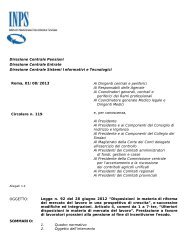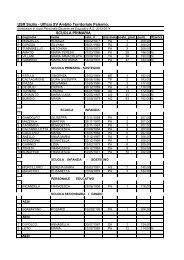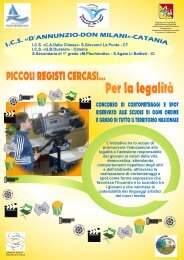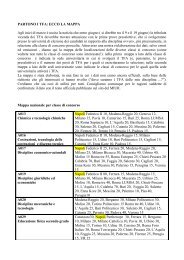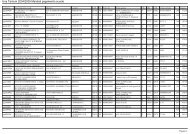Analisi - knowledge management case studies - Aetnanet
Analisi - knowledge management case studies - Aetnanet
Analisi - knowledge management case studies - Aetnanet
You also want an ePaper? Increase the reach of your titles
YUMPU automatically turns print PDFs into web optimized ePapers that Google loves.
of Working get paid their hourly rates by customers in Operating Units asking services from<br />
this team, e.g. all the Production Chemists in the Exploration and Production Operating Units<br />
who want New Ways of Working to help them build a common interest network on<br />
Production Chemistry for them.<br />
Bottom-up<br />
New Ways of Working started (see also: Organisational structure and HRM<br />
Common Interest Networks<br />
Shell has around 60 common interest networks worldwide and is in the process of combining<br />
them into less, but larger communities with a broader scope. Each network covers a certain<br />
related set of topics, part of their discipline. For example, the drilling engineers part of the<br />
wells network are discussing about drilling ‘ultra slim’ holes and the people who purchase<br />
drilling related equipment discuss their topics in their part within the same network. The<br />
people joining a network are sometimes part of the core network and sometimes in the<br />
periphery of the network and jump in whenever something that draws their attention comes<br />
by. In order to ensure that the community remains active a moderator provides support. In<br />
many <strong>case</strong>s a moderator moderates between 1 – 3 days each week. The most successful<br />
larger networks have a fulltime moderator, funded by the Operating Units with a major<br />
interest in the business processes discussed in the network. The moderator is:<br />
• the ambassador and marketeer of the community;<br />
• the community builder;<br />
• responsible for creating and maintaining momentum in the community;<br />
• managing, sometimes even editing the content;<br />
• ensures questions get answered;<br />
• and requests (and chases) for contributions.<br />
The best expert is usually not the best moderator: other people may stop contributing if a<br />
moderator keeps adding comments to contributions from others.<br />
In larger, globally operating, networks three other roles are identified to support the<br />
community: a Subject Focal Point, moderating a part of the network, Local Coordinator<br />
energising all the members in his/her Operating Unit and a Global Coordinator acting as<br />
chairman and energiser for the total community. For an explanation of their necessity and<br />
their tasks is refered to the section called: Errore. L'autoriferimento non è valido per un<br />
segnalibro. - Implementing new organisational structure slowly.<br />
Appraisal system<br />
People do get recognised in a community by their contributions and by exposing their<br />
<strong>knowledge</strong>. This can occasionally contribute to financial rewards: a promotion can be<br />
triggered by the reputation contributors have built up in their community. It is obvious that if<br />
people are able to see these tangible benefits of sharing their <strong>knowledge</strong>, they will become<br />
more inclined to change their behaviour accordingly.<br />
By observations it was discovered that there is a culture arising within Shell, where people<br />
are saying ‘I didn’t invent this myself, I took ideas from him.’ Using ideas from others starts<br />
being encouraged and is popping up in some appraisal systems within individual operating<br />
companies. In these companies it is more beneficial for an individual to search for solutions<br />
already available, solicit suggestions and to admit that you have used someone else’s idea<br />
instead of developing your own solution. In some parts of the company the appraisal systems<br />
contain elements related to publishing information and to assisting others.<br />
Comparing individual Shell companies or business units merely on their own bottom line<br />
performance can be a hindering factor in <strong>knowledge</strong> sharing – sharing information reduces<br />
the competive advantage of an individual company in comparison to their peers within the<br />
Shell Group. This is to be compensated by including elements in the comparison as “total<br />
contribution to the Shell Group”, “implemented innovations by and from other companies”.<br />
CIBIT 38<br />
analisi-KM <strong>case</strong> <strong>studies</strong>.doc - 25/5/99






